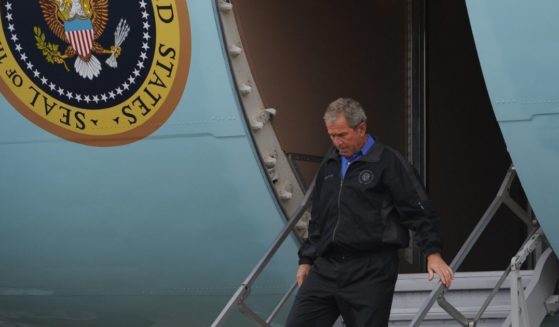
In the hectic hours that followed the Sep. 11, 2001, terror attacks in New York City and Washington, D.C., the nation seemed to collectively realize two things: We were under attack, and America would most certainly be striking back.
Then-President George W. Bush was sitting in a Florida classroom with a group of schoolchildren when he received the news that the second plane had hit the World Trade Center in New York City.
Andy Card, Bush’s chief of staff, famously leaned over and whispered to the president as the children were absorbed in their books, “A second plane hit the second tower.”
The president and his team had learned of the first plane when they arrived at the school earlier that day and had been scrambling to find out more under the constraints of early-21st century communication.
“America is under attack,” Card quietly told the president.
Bush’s team would spend the next several hours alone in the skies in Air Force One, unsure of what else to do with the commander-in-chief.
According to a 2016 report published in Politico — “We’re the Only Plane in the Sky” — which recorded an oral history of the movements taken by the president and those who traveled with him on that day, Bush and his team were torn between returning to Washington, D.C., to reassure the stunned nation and keeping the commander-in-chief of the armed services safe as it remained unclear if further attacks would come.
Air Force One ultimately landed at Barksdale Air Force Base in Louisiana, which had already been in the middle of an annual nuclear surety exercise when its commanders became aware of the attacks.
The base was on high alert by the time the men on the ground were informed that Air Force One was approaching — and the president’s handlers remember that once they hit the ground, everything changed, and the reality of the events of that day sank in.
“I remember just how different it was, landing at Barksdale. Everything just had changed in an instant. We’d got off the plane and we were at war,” Capt. Cindy Wright, the presidential nurse, recalled.
The president’s team was scrambling to get oriented, but the members of the armed forces were already ready, locked and loaded to defend our country.
“As soon as we landed, Mark Rosenker [director of the White House Military Office] and I went off the back stairs. There’s this guy who looks like General Buck Turgidson from Dr. Strangelove, big guy, all decked out in a bomber jacket,” Brian Montgomery, the White House director of advance, remembered.
“He was straight out of central casting. We said, ‘What do you need?’ He said, ‘See those planes? Every one is loaded with nukes — tell me where you want ’em.’ We look over and there are just rows of B-52s, wingtip to wingtip. I joked, ‘Gosh, don’t tell [the president!].’”
It was from Barksdale, surrounded by no doubt equally adamant airmen, that the president, just eight months into his first term, would address the nation on the deadliest attack to ever take place on American soil.
“Freedom itself was attacked this morning by a faceless coward,” Bush said in his speech that afternoon. “And freedom will be defended.”
“Make no mistake,” he declared. “The United States will hunt down and punish those responsible for these cowardly acts.”
It was clear from Montgomery’s interaction with the determined airman that the armed forces were most certainly on Bush’s side at the time.
It is certainly a blessing our response didn’t come to a nuclear offensive, despite the level of eager preparedness — and the military action taken by our country over the next two decades will not likely be remembered in history in an entirely positive light, to say the least.
Yet what we remember this weekend is the indignant, proud, fighting spirit of the American people who were determined not to let our enemies get away with what they’d just done.
As our own nation has marked the two-decade anniversary of the attacks just after one of its most shameful military events in history, it is all the more infuriating to think that this fighting spirit has become almost taboo — believing in the exceptionalism and military might of our nation is often seen as being akin to domestic terrorism.
It pains me to say, in many ways, our enemy has won. Or at least, they’ve managed to carry off a series of devastating attacks on our sense of national pride and dignity. We are just as strong — yet we have lost this fighting spirit.
As we remember 9/11 twenty years later, let’s honor the memory of those lost that day as well as the two decades that followed by committing to reviving this spirit.
Our nation is under attack in a new way now — and we’ve got to be all the more ready to defend it, lest we lose our strength and fighting spirit for good.
